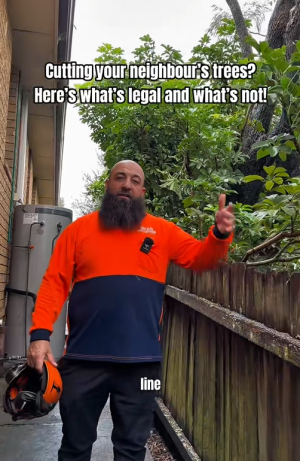Are you breaking the law by trimming your neighbour’s trees? Aussie expert reveals what you really need to know
By
Gian T
- Replies 0
If you’ve ever found yourself glaring at a neighbour’s overgrown tree that’s dropping leaves, blocking your sunlight, or threatening to turn your gutters into a compost heap, you’re not alone. Overhanging branches are one of the most common causes of neighbourhood disputes in Australia, right up there with barking dogs and mysterious wheelie bin swaps!
But before you reach for the secateurs or plot a midnight mission with the hedge trimmer, it’s worth knowing exactly what you can (and can’t) do when it comes to encroaching vegetation. As it turns out, the law is a bit more complicated than 'my side, my rules'.
The Golden Rules of Tree Trimming: What the Experts Say
Warren Yaghmour, a seasoned tree pruning expert from True Blue Tree Lopping in Sydney, recently took to TikTok to clear up the confusion—and potentially save a few friendships (and wallets) in the process. His number one piece of advice? Don’t, under any circumstances, throw the branches back over the fence.
'Don’t chuck the branches back over is definitely the first rule of thumb. That will just get you in all sorts of a mess,' Warren warns. Not only is it likely to escalate tensions, but it could also land you in hot water legally.
Instead, Warren says, always follow Australian standards and your local council’s regulations. 'Of course, everything has to go [by] Australian standards and council regulations,' he explains. 'We’re only allowed 10 per cent, we’re not allowed to touch the canopy of the tree, so the top branches you’re not allowed to prune. It’s all the lower stuff as close as we can, and all cuts go to Australian standards, and they’re back to the collar.'
Why You Shouldn’t Go Rogue With the Loppers
It might be tempting to hack away at any branch that dares to cross your property line, but Warren cautions against taking matters into your own hands without doing your homework. Cutting only half the branches, for example, is a big no-no. Not only can it damage the tree, but it could also see you facing a fine or a trip to the NSW Civil and Administrative Tribunal (NCAT).
'Different species of trees require different assessments, and sometimes you’re allowed to trim big branches and sometimes not,' Warren says. 'You’ve got to find out every single suburb’s council, and then go through their list and see what you’re allowed to do and what not.'
Common Questions (and Answers!) About Overhanging Branches
Our readers often have a few burning questions about this prickly topic, so let’s tackle some of the most common ones:
What if the branches are blocking my solar panels?
If the foliage is growing over to your side, you’re generally allowed to trim it back to the boundary line—but only as far as your local council allows.
What if it’s the top branches causing the problem?
Unfortunately, you’re usually only allowed to trim the lower branches. The canopy (top branches) is often protected, and pruning it can harm the tree or breach council rules.
Can I just throw the clippings back over the fence?
Absolutely not! As satisfying as it might feel, this is a surefire way to escalate the dispute and could even be considered illegal dumping.
Isn’t it my neighbour’s responsibility to maintain their trees?
While it’s courteous for neighbours to keep their trees in check, the law generally allows you to trim branches that cross onto your property—within the rules. But you’re responsible for disposing of the clippings unless you’ve agreed otherwise.
What Does the Law Actually Say?
According to the NSW Trees (Disputes Between Neighbours) Act 2006, you’ll often need a council permit to prune or remove a tree, unless the tree is exempt due to its type or condition. If a neighbour’s tree causes damage to your property, you may be able to seek compensation through the Land and Environment Court.
It’s also worth noting that rules can vary significantly between councils and states. Some councils are stricter than others, and certain species of trees (like heritage-listed or native trees) may have extra protections.
How to Keep the Peace (and Stay Out of Court)
- Talk first: A friendly chat with your neighbour can go a long way. They may not even realise their tree is causing a problem.
- Check the rules: Visit your local council’s website or give them a call to find out what you’re allowed to do.
- Get it in writing: If you agree with your neighbour to prune or remove a tree, put it in writing to avoid misunderstandings.
- Hire a professional: If in doubt, call in a qualified arborist who knows the local laws and can prune safely and legally.
A Few Extra Tips for Seniors
- If you’re not comfortable climbing ladders or handling tools, don’t risk it—your safety comes first.
- Some councils offer free or discounted green waste collection for seniors, so check if you’re eligible.
- If you’re in a retirement village or strata property, there may be additional rules or services available.
Have Your Say!
Have you ever had a run-in with a neighbour over a tree? Did you manage to resolve it peacefully, or did it end up in a tangle? Share your stories, tips, or questions in the comments below—we’d love to hear from you!
Credit: TikTok

And remember: a little knowledge (and a lot of courtesy) can keep your garden—and your neighbourly relations—blooming.
Read more: Locals are demanding tree removals—should councils listen or hold the line?
But before you reach for the secateurs or plot a midnight mission with the hedge trimmer, it’s worth knowing exactly what you can (and can’t) do when it comes to encroaching vegetation. As it turns out, the law is a bit more complicated than 'my side, my rules'.
The Golden Rules of Tree Trimming: What the Experts Say
Warren Yaghmour, a seasoned tree pruning expert from True Blue Tree Lopping in Sydney, recently took to TikTok to clear up the confusion—and potentially save a few friendships (and wallets) in the process. His number one piece of advice? Don’t, under any circumstances, throw the branches back over the fence.
'Don’t chuck the branches back over is definitely the first rule of thumb. That will just get you in all sorts of a mess,' Warren warns. Not only is it likely to escalate tensions, but it could also land you in hot water legally.
Instead, Warren says, always follow Australian standards and your local council’s regulations. 'Of course, everything has to go [by] Australian standards and council regulations,' he explains. 'We’re only allowed 10 per cent, we’re not allowed to touch the canopy of the tree, so the top branches you’re not allowed to prune. It’s all the lower stuff as close as we can, and all cuts go to Australian standards, and they’re back to the collar.'
Why You Shouldn’t Go Rogue With the Loppers
It might be tempting to hack away at any branch that dares to cross your property line, but Warren cautions against taking matters into your own hands without doing your homework. Cutting only half the branches, for example, is a big no-no. Not only can it damage the tree, but it could also see you facing a fine or a trip to the NSW Civil and Administrative Tribunal (NCAT).
'Different species of trees require different assessments, and sometimes you’re allowed to trim big branches and sometimes not,' Warren says. 'You’ve got to find out every single suburb’s council, and then go through their list and see what you’re allowed to do and what not.'
Common Questions (and Answers!) About Overhanging Branches
Our readers often have a few burning questions about this prickly topic, so let’s tackle some of the most common ones:
What if the branches are blocking my solar panels?
If the foliage is growing over to your side, you’re generally allowed to trim it back to the boundary line—but only as far as your local council allows.
What if it’s the top branches causing the problem?
Unfortunately, you’re usually only allowed to trim the lower branches. The canopy (top branches) is often protected, and pruning it can harm the tree or breach council rules.
Can I just throw the clippings back over the fence?
Absolutely not! As satisfying as it might feel, this is a surefire way to escalate the dispute and could even be considered illegal dumping.
Isn’t it my neighbour’s responsibility to maintain their trees?
While it’s courteous for neighbours to keep their trees in check, the law generally allows you to trim branches that cross onto your property—within the rules. But you’re responsible for disposing of the clippings unless you’ve agreed otherwise.
What Does the Law Actually Say?
According to the NSW Trees (Disputes Between Neighbours) Act 2006, you’ll often need a council permit to prune or remove a tree, unless the tree is exempt due to its type or condition. If a neighbour’s tree causes damage to your property, you may be able to seek compensation through the Land and Environment Court.
It’s also worth noting that rules can vary significantly between councils and states. Some councils are stricter than others, and certain species of trees (like heritage-listed or native trees) may have extra protections.
How to Keep the Peace (and Stay Out of Court)
- Talk first: A friendly chat with your neighbour can go a long way. They may not even realise their tree is causing a problem.
- Check the rules: Visit your local council’s website or give them a call to find out what you’re allowed to do.
- Get it in writing: If you agree with your neighbour to prune or remove a tree, put it in writing to avoid misunderstandings.
- Hire a professional: If in doubt, call in a qualified arborist who knows the local laws and can prune safely and legally.
A Few Extra Tips for Seniors
- If you’re not comfortable climbing ladders or handling tools, don’t risk it—your safety comes first.
- Some councils offer free or discounted green waste collection for seniors, so check if you’re eligible.
- If you’re in a retirement village or strata property, there may be additional rules or services available.
Have Your Say!
Have you ever had a run-in with a neighbour over a tree? Did you manage to resolve it peacefully, or did it end up in a tangle? Share your stories, tips, or questions in the comments below—we’d love to hear from you!
Credit: TikTok
Key Takeaways
- Aussies dealing with overhanging trees from a neighbour’s yard should always follow Australian standards and check their local council’s regulations before trimming any branches.
- Chucking pruned branches back over the fence is a definite no-go and can escalate neighbourhood disputes.
- Only up to 10 per cent of a tree can generally be pruned, and it’s usually limited to the lower branches—not the canopy—unless council regulations allow otherwise.
- Cutting the right branches and understanding the specific rules for each tree species can help avoid fines, legal trouble, or a trip to the NSW Civil and Administrative Tribunal.
And remember: a little knowledge (and a lot of courtesy) can keep your garden—and your neighbourly relations—blooming.
Read more: Locals are demanding tree removals—should councils listen or hold the line?
Last edited:








